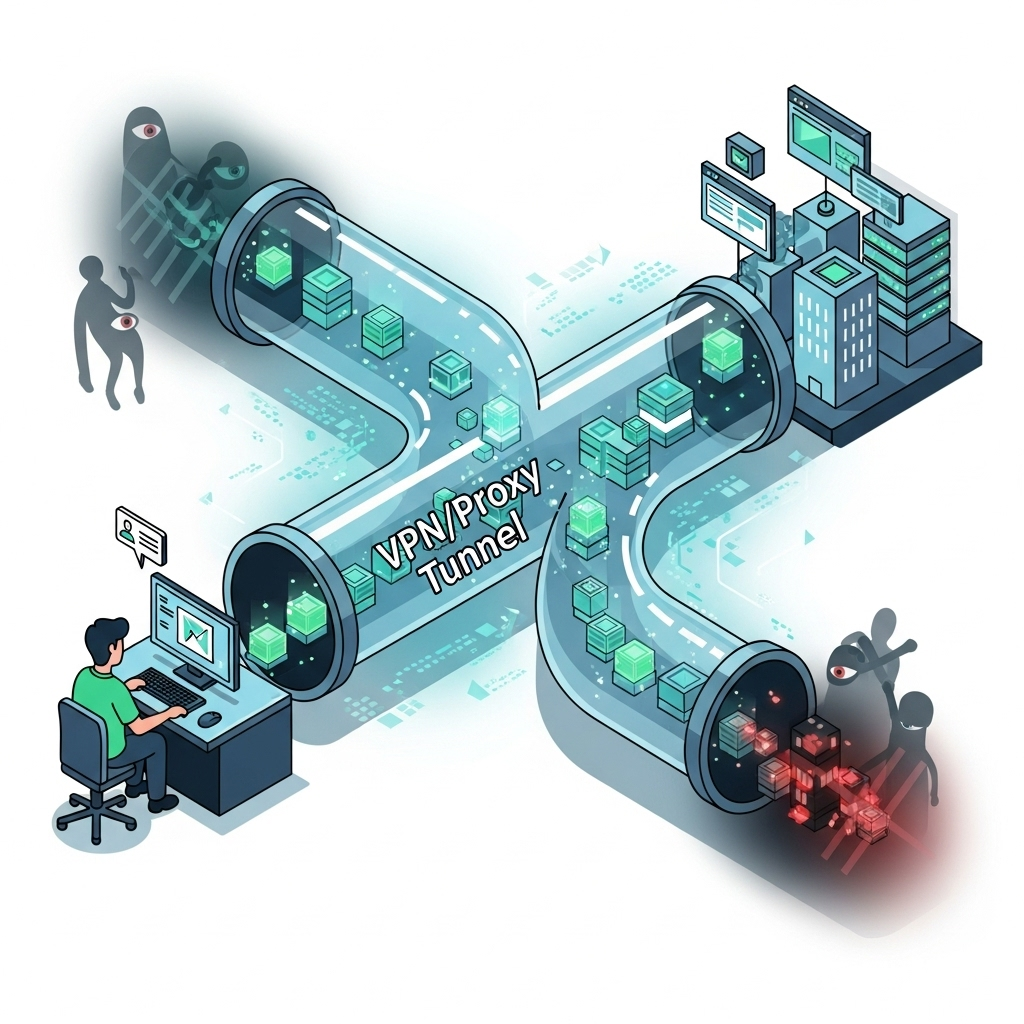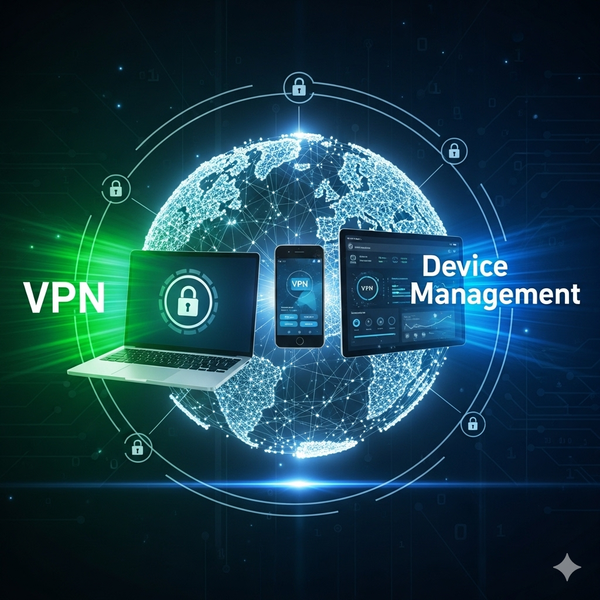The Ultimate Guide to Online Privacy: VPNs vs. Proxies

Part 1: What's the Big Deal About Online Privacy?
In today's interconnected world, nearly every aspect of our lives is tied to the internet. From banking and shopping to social media and entertainment, our digital footprint is constantly expanding. But with great convenience comes a significant challenge: maintaining online privacy. Many people don't realize that their online activities are being tracked, monitored, and collected by various entities. Your Internet Service Provider (ISP) can see which websites you visit, governments might monitor your communications, and malicious actors are always looking for ways to steal your personal data. This isn't just a concern for the tech-savvy; it's a real issue for everyone who uses the internet.
So, what exactly is the threat? Every time you browse the web, your device sends and receives data. This data can reveal a lot about you, including your location, browsing habits, and personal information. Without proper protection, this information is exposed and vulnerable. Data brokers collect and sell your browsing history for targeted advertising. Governments may impose censorship, restricting access to certain websites and information. And on public Wi-Fi networks, cybercriminals can easily intercept your unencrypted data, putting your passwords and financial details at risk.
This is where tools like a VPN (Virtual Private Network) and a proxy server come into play. They act as intermediaries between your device and the internet, masking your identity and protecting your data. While they both serve a similar purpose—helping you maintain some anonymity and access content that might be blocked—they work in fundamentally different ways. Understanding these differences is crucial for choosing the right tool to protect your digital life. Whether you're a casual browser, a streamer, or a professional handling sensitive information, taking control of your online privacy is the first step towards a safer and freer internet experience.
Part 2: Proxy Servers – The Quick and Simple Solution
If you've ever looked for a way to hide your IP address, you've likely come across proxy servers. In the simplest terms, a proxy is a server that acts as a go-between for your device and the internet. Instead of connecting directly to a website, your request goes to the proxy server first. The proxy then forwards your request to the website on your behalf, using its own IP address. The website sees the proxy's IP, not yours, which provides a basic level of anonymity. This is often enough to bypass simple geographic restrictions or access websites that have blocked your specific IP address.
There are several types of proxies, but the two most common are HTTP and SOCKS. An HTTP proxy is designed specifically for web traffic. It's fast and effective for browsing, but it only works for applications that use the HTTP or HTTPS protocols. For example, you could use an HTTP proxy to watch a video on a streaming site that's blocked in your country. A SOCKS proxy is more versatile. It's not limited to specific types of traffic and can handle requests for things like torrents, online gaming, and email. While a SOCKS proxy offers more flexibility, it generally doesn't provide the same level of performance as an HTTP proxy for web browsing.
The main advantage of using a proxy is its simplicity. They are easy to set up and can be very fast, as they don't involve the complex encryption process that VPNs do. However, this simplicity comes at a cost to your security. Proxies don't encrypt your traffic. Your data is still visible to your ISP and anyone else who might be monitoring the network, like an administrator on a public Wi-Fi network. This makes them a poor choice for handling sensitive information like passwords or banking details. A proxy only changes your IP address; it doesn't protect your data from being seen. It's like putting on a different mask for a party, but your clothes are still completely visible to everyone. For a truly secure browsing experience, a proxy simply doesn't offer enough protection.
Part 3: VPNs – The Gold Standard for Security and Freedom
When it comes to comprehensive online security, a VPN (Virtual Private Network) is the undisputed champion. Unlike a simple proxy, a VPN doesn't just change your IP address; it creates a secure, encrypted tunnel for all your internet traffic. Think of it as a private, invisible highway for your data. When you connect to a VPN server, your device’s entire internet connection is routed through this tunnel. Every piece of data—from a simple search query to a video stream—is scrambled into unreadable code before it leaves your device. This process is called encryption.
The key advantage of a VPN is this end-to-end encryption. Your Internet Service Provider can't see what websites you're visiting or what data you're sending and receiving. This is crucial for maintaining your privacy and preventing data tracking. A VPN also protects you from cybercriminals on public Wi-Fi networks. Since your data is encrypted, even if a hacker intercepts it, they won't be able to read it. This is why a VPN is essential for anyone who frequently connects to public hotspots in cafes, airports, or hotels.
Another major benefit is the ability to bypass geographical restrictions. By connecting to a VPN server in another country, you can make it appear as though you are browsing from that location. This gives you access to a world of content that might be blocked in your region, whether it's a streaming service, social media platform, or news website. A good VPN service, like the one offered by Winston VPN, gives you access to blocked websites while protecting your data. You can get started with their bot at https://t.me/vpn_winston_bot and even try it for free with a 3-day trial.
Of course, no tool is perfect. Because a VPN encrypts all of your traffic, it can sometimes slow down your internet connection. The speed reduction depends on the quality of the VPN service and the distance to the server you are connected to. Some free VPNs can be particularly slow and even sell your data, which defeats the entire purpose of using a VPN. That's why choosing a reliable, paid service with a clear privacy policy is so important. With Winston VPN, you get a reliable, secure connection and can connect up to 5 devices on a single subscription, ensuring all your devices are protected.
Part 4: VPN vs. Proxy: A Head-to-Head Comparison
Choosing between a VPN and a proxy can be confusing, as they both offer similar benefits like IP masking and access to geo-restricted content. However, their fundamental differences in security and functionality are critical. To make the best decision for your needs, let's look at a direct comparison.
A proxy is a great choice for quick, low-stakes tasks. For instance, if you just want to access a website that's temporarily blocked in your country or need to test a site from a different location, a proxy can get the job done quickly without much fuss. It's the equivalent of a simple disguise—it hides your identity but doesn't offer any real protection. However, a proxy is not a good choice for handling sensitive information. Because there's no encryption, your passwords, banking details, and other private data are still vulnerable to anyone monitoring your network.
A VPN is the superior solution for anyone concerned about their digital privacy and security. It offers a comprehensive shield for your entire internet connection, not just a single application. If you regularly use public Wi-Fi, a VPN is non-negotiable. It secures your connection and prevents cybercriminals from intercepting your data. A VPN is also essential for anyone who wants to ensure their browsing habits remain private from their ISP or government surveillance. For those who stream content or torrent, a VPN is the only way to do so securely and privately. The encryption ensures your activities are hidden, and you can also bypass any content restrictions.
Ultimately, the choice comes down to your needs. If you're looking for a quick and simple way to change your IP address, a proxy might suffice. But if you value your privacy, security, and the freedom to browse without limits, a VPN is the clear winner. A service like Winston VPN provides a robust solution, giving you access to blocked websites and protecting all your data with strong encryption, all on up to 5 devices with one subscription. You can try it out yourself for three days for free by visiting their bot at https://t.me/vpn_winston_bot.
Part 5: Choosing the Right Tool for Your Needs
Deciding between a proxy and a VPN depends entirely on your specific goals and security requirements. To make the right choice, ask yourself what you're trying to achieve.
· For quick content access: If your only goal is to bypass a regional block on a website to view a single piece of content, a free proxy server might work. It's a fast solution for a one-time need, but remember that it offers no security.
· For streaming and gaming: You'll want a reliable VPN. A VPN provides the speed and stability needed for a smooth streaming experience while also giving you access to different content libraries. For gamers, a VPN can reduce ping and improve connection stability, all while protecting you from DDoS attacks.
· For secure browsing and data protection: This is where a VPN is absolutely essential. Whether you're handling personal finances, using social media, or just reading the news, a VPN ensures that your data is encrypted and your privacy is maintained.
· For travel and public Wi-Fi: Always use a VPN. Public hotspots are notorious for being insecure, and your data is an easy target for hackers. A VPN's encryption is your best defense.
When you decide a VPN is the right tool, it's important to choose a good service. Don't fall for free VPNs, as many of them track your data or have slow speeds. Look for a service that offers strong encryption protocols, a strict no-logs policy, and a wide selection of server locations.
A great option to consider is Winston VPN. It's designed to be simple and effective. It provides a reliable and secure connection, allowing you to access blocked websites and protecting your data from prying eyes. With a single subscription, you can connect up to 5 devices, ensuring your entire digital life is secure, from your phone to your laptop. To make it even easier to get started, they offer a 3-day free access period. You can find their bot at https://t.me/vpn_winston_bot and begin your journey to a safer, more private internet today.
Part 6: How to Set Up and Use Your VPN
Once you've chosen a reliable VPN service, getting started is straightforward. The setup process is designed to be simple for even the least tech-savvy user, and most services provide clear, step-by-step instructions.
1. Download the app: Start by downloading the VPN application from the service's official website or, in the case of Winston VPN, their Telegram bot at https://t.me/vpn_winston_bot. Make sure you download the correct version for your device, whether it's a desktop computer, smartphone, or tablet.
2. Install and log in: Follow the installation prompts on your device. Once the app is installed, you'll need to log in using the credentials you created during the sign-up process.
3. Choose a server: The app will present you with a list of server locations. Choose a server that is closest to you for the best speed, or select a server in a different country to access geo-restricted content. A good VPN service offers a wide range of server locations to give you maximum flexibility.
4. Connect: Simply click the "Connect" button. The VPN will then establish a secure, encrypted connection, and your internet traffic will be routed through the chosen server. You'll know it's working because your IP address will change, and you'll have access to content from the server's location.
Using a VPN is just as simple. Once connected, you can browse, stream, and download as you normally would, but with the added peace of mind that your data is secure. For instance, if you're working from a cafe, you can connect to your VPN before accessing your email or banking app. Your information will be protected from anyone on the same public Wi-Fi network.
To maintain the best performance and security, follow these tips:
· Keep the app updated: Always ensure your VPN application is running the latest version to benefit from new security features and bug fixes.
· Use a Kill Switch: Many good VPNs, like Winston VPN, have a feature called a "kill switch." This automatically disconnects your internet if the VPN connection drops, preventing your real IP address and data from being exposed, even for a moment.
· Switch servers: If you notice a significant drop in speed, try connecting to a different server. Sometimes, a server can be overloaded, and switching to another can restore your performance.
The right VPN can be a powerful tool for taking back control of your online life. It gives you the freedom to access the content you want and provides the security to protect your sensitive data from prying eyes. Winston VPN makes this simple, offering a reliable service that allows you to connect up to 5 devices on a single subscription. With a 3-day free access trial, there's no reason not to see how a VPN can transform your online experience.


